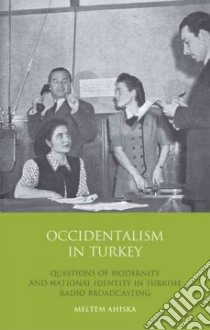Occidentalism in Turkey - 9781845116538
Un libro in lingua di Meltem Ahiska edito da Tauris Academic Studies, 2010
- € 130.70
- Il prezzo è variabile in funzione del cambio della valuta d’origine
`This remarkable book delves into the early days of radio broadcasting in Turkey to explore what the author refers to as the `dialogical making of modernity in a non-Western context'.
It offers, in the first instance, a penetrating study of how radio production -as a novel communication technology - was created and utilized as a public political instrument. Through an intricate analysis of original archival materials on radio talks and dramas, it unlocks the `audible past' of the nation. As such, it gives us a new perspective on a history we thought we knew: not just a detailed portrait of political subjectivities of the Turkish elite during the early days of nation building, but also how the disembodied voice of the radio reached into the fabric of daily life to trigger new imaginaries and desires...In sum, Meltem Ahiska's work is a genuine tour-deforce'
Ayse Oncu, Professor of Sociology, Sabanaci University
`This is a theoretically sophisticated and ambitious work, which makes a critical contribution to a number of areas of contemporary scholarly and political debate. At one level, the book provides a much needed scholarly account of the history of Turkish broadcasting in the mid-twentieth century and the cultural politics of Kemalism more generally. But while this book has a particular historical focus, its ambitions are large, and it will appeal to a wide range of readers in post-colonial studies, sociology and media studies, beyond those interested specifically in Turkish politics and history or the history of radio broadcasting.
The broader intellectual contribution of Meltem Ahiska's work [includes] a sustained analysis of the concept of Occidentalism. While the term has been increasingly used as a marker of anti-Westernism, Meltem Ahiska rethinks and develops the concept in relation to post-colonial social theory, integrating psychoanalytic understandings of fantasy and ambivalence with a Foucauldian analysis of political discourse, using the institution of radio as a means through which to interrogate the political subjectivity of the Turkish political elite.'
Andrew Barry, Reader in Geography, Fellow of St Catherine's College, Oxford
From the early Ataturk years, Turkish radio broadcasting was seen as a great hope for sealing the national identity of the new Turkish Republic. Beginning in the 1930s, the national elite designed radio broadcasting to represent the `voice of a nation'. Here, Meltem Ahiska reveals how radio broadcasting actually showed Turkey's uncertainty over its position in relation to Europe.
While the national elite wanted to build their own Turkish identity, at the same time they desired recognition from Europe that Turkey was now a Westernized modem country. Ahiska shows how these tensions played out over the radio in the conflicting depictions and discrepancies between the national elite and `the people'; `cosmopolitan' Istanbul and `national' Ankara; and between men and women (especially in Radio drama). Through the medium of radio broadcasting we can see how Occidentalism dictated the Turkish Republic's early history and shaped how modern Turkey saw itself.
By undertaking a detailed analysis of the organisation, programmes, missions and criticisms of Turkish radio, Ahiska pieces together the ways in which radio broadcasting was used as a public political instrument. She goes on to challenge existing theories of national identity and modernisation, and argues for a new way of theorising modern history in relation to the Western constructions of modernity. Occidentalism in Turkey provides a new perspective on the story of Turkish modernisation, and represents an important development in the fields of modern Turkish History, Sociology and Media Studies.
Informazioni bibliografiche
- Titolo del Libro in lingua: Occidentalism in Turkey
- Sottotitolo: Questions of Modernity and National Identity in Turkish Radio Broadcasting
- Lingua: English
- Autore: Meltem Ahiska
- Editore: Tauris Academic Studies
- Collana: Tauris Academic Studies (Hardcover)
- Data di Pubblicazione: 15 Giugno '10
- Genere: SOCIAL SCIENCE
- Pagine: 271
- ISBN-10: 1845116534
- EAN-13: 9781845116538


